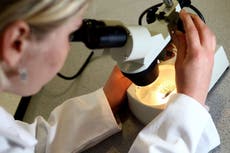More than a million lives saved from cancer in the last four decades
Developments in cancer prevention, diagnosis and treatment have contributed to these falling rates, according to new analysis by Cancer Research UK
More than a million lives have been saved from cancer in the last four decades due to advances in treatment and care, new research suggests.
Since the 1980s, UK cancer death rates have fallen by almost a quarter, saving 1.2 million people, according to new analysis by Cancer Research UK.
These rates have fallen thanks to developments in cancer prevention, diagnosis and treatment, including improvements in radiotherapy, screening programmes, drug developments and gene discoveries, the charity said.
Cancer Research UK chief executive, Michelle Mitchell, said that these advancements “reflect the power of research,” and recognised that “a huge number of people in the last 40 years have reached milestones in their lives they didn’t think they’d see”.
“These trends show that together, we are beating cancer – and we couldn’t have made the breakthroughs that have changed people’s lives without the generosity of the British public.”
However, despite these improvements, cancer remains the leading cause of death in the UK, and advances have not been equal across all cancers, Cancer research added.
The charity also raised concerns about the “enormous strain” facing both the NHS and the research sector.
“The situation for people affected by cancer across the UK remains worrying. Long waiting times are leaving many people facing fear and uncertainty,” the Charity stated.
Dame Cally Palmer, NHS national cancer director, said: “The NHS has been seeing and treating record numbers of people for cancer, with survival rates now at an all-time high.”
“From piloting multi-cancer early detection tests to the rollout of lung health checks and the latest precision therapies, NHS teams across the country are making huge progress in the early detection and treatment of cancer and in saving more lives.”
Cancer Research UK pointed to continued investment in cancer research, strong political leadership, and the continued support of the public, to improve these rates further.
“Cancer is a fixable problem,” added Michelle Mitchell.
The charity said that the cancer death rate peaked in 1985 for men and 1989 for women. Its analysis found that more cancer deaths have been prevented in men, compared to women. This is partly due to an earlier fall in smoking rates seen among men, it said.
Overall, the charity estimates, that since the 1980s:
– 560,000 lung cancer deaths have been avoided, largely due to reductions in smoking.
– 236,000 stomach cancer deaths have been averted, which has been attributed to the fact that H Pylori, a type of infection linked to an increased risk of stomach cancer, is no longer common.
– 224,000 bowel cancer deaths have been prevented. Cancer Research UK said that this can partly be attributed to research which found that giving patients chemotherapy before surgery helped to shrink tumours, making them easier to remove.
– 17,000 breast cancer deaths have been avoided, largely linked to the introduction of the breast cancer screening programme and drug developments.
Professor Jean Abraham, breast cancer researcher at the University of Cambridge, suggested: “This is a golden era for cancer research.”
“In my own field of personalising breast cancer treatments, we’re now able to complete genome sequencing from the lab to the clinic in a matter of days, when 10 years ago it would have taken months.”
Described as ‘game-changing’, researchers can now utlitise a patient’s unique genetic markers to personalise their medical treatment, allowing doctors to find the exact course of action best suited to individuals, Professor Jean Abraham added.
“But for all the progress we’ve made there is so much more about cancer that we don’t know. That is why it’s crucial that we continue pioneering cancer research to save more lives.”
Cancer Research UK released these figures as it launches its latest campaign called “Together We Are Beating Cancer”.
Join our commenting forum
Join thought-provoking conversations, follow other Independent readers and see their replies
Comments





Bookmark popover
Removed from bookmarks